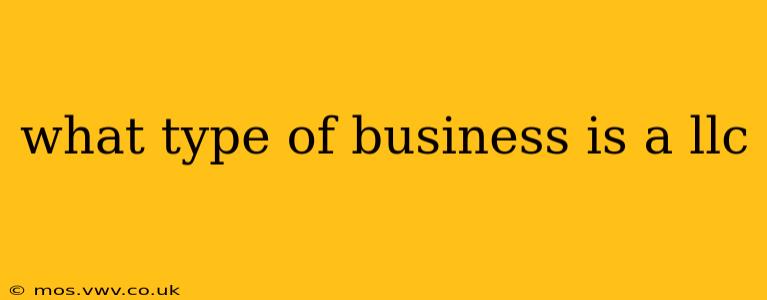What Type of Business is an LLC?
An LLC, or Limited Liability Company, is a business structure that combines the benefits of a sole proprietorship/partnership and a corporation. It's a popular choice for small to medium-sized businesses because it offers liability protection while maintaining relative simplicity in management and taxation. Understanding its nature requires examining its key characteristics.
What are the main characteristics of an LLC?
An LLC offers several key features that distinguish it from other business structures:
-
Limited Liability: This is the core benefit. The personal assets of the owners (members) are generally protected from business debts and lawsuits. If the LLC faces legal action, creditors can only pursue the LLC's assets, not the members' personal property, such as homes, cars, or savings accounts. This separation of personal and business liability is a significant advantage.
-
Flexibility in Management and Operation: LLCs can be managed in several ways. They can be member-managed (members directly manage the business) or manager-managed (members appoint managers to run the company). This flexibility allows for customized structures to suit the needs and preferences of the owners.
-
Tax Advantages: LLCs themselves don't pay taxes. Instead, the profits and losses are "passed through" to the members' personal income tax returns. This is known as pass-through taxation, and it avoids the double taxation that corporations face (tax on corporate profits and again on dividends paid to shareholders). The specific tax implications can vary depending on the state and the number of members.
-
Simple Setup and Maintenance: Compared to corporations, LLCs are generally easier to form and maintain. The paperwork and regulatory compliance requirements are typically less burdensome.
-
Credibility: An LLC offers a degree of credibility and professionalism that a sole proprietorship or partnership might lack. It projects a more formal and established business image.
What are some examples of businesses that use the LLC structure?
Many different types of businesses utilize the LLC structure. Here are a few examples:
-
Small retail stores: A local boutique or bookstore might choose an LLC for liability protection and pass-through taxation.
-
Consulting firms: A consulting business often operates as an LLC to separate personal and business assets.
-
Real estate investment companies: LLCs are popular for real estate ventures, shielding personal assets from potential investment risks.
-
Freelancers and independent contractors: Even solo entrepreneurs often form LLCs for liability protection, even though they might be the only member.
-
Technology startups: Many technology startups choose the LLC structure for its flexibility and ease of management in their early stages.
What is the difference between an LLC and a sole proprietorship?
A sole proprietorship is the simplest business structure, where the business and the owner are legally the same. This means the owner is personally liable for all business debts and obligations. An LLC offers the crucial advantage of limited liability, separating the owner's personal assets from the business's liabilities.
What is the difference between an LLC and a corporation?
A corporation is a more complex legal entity, separate and distinct from its owners (shareholders). While corporations also provide limited liability, they face the burden of double taxation, paying taxes on corporate profits and then again on dividends paid to shareholders. LLCs generally offer simpler administration and avoid double taxation.
What are the disadvantages of an LLC?
While LLCs offer significant benefits, they also have some drawbacks:
- State-Specific Regulations: LLC regulations vary from state to state, requiring research and compliance with specific requirements.
- Limited Life: In some states, the LLC's existence might be tied to the life of its members.
- Complexity in Certain Situations: While generally simpler than corporations, LLCs can become more complex when dealing with multiple members or significant business growth.
In conclusion, an LLC is a versatile business structure offering a balance of liability protection, management flexibility, and tax advantages. It's a popular choice for various businesses seeking a structure that provides both protection and operational simplicity. However, it's crucial to understand the specifics of LLC regulations in your state and consider the potential drawbacks before choosing this structure.
